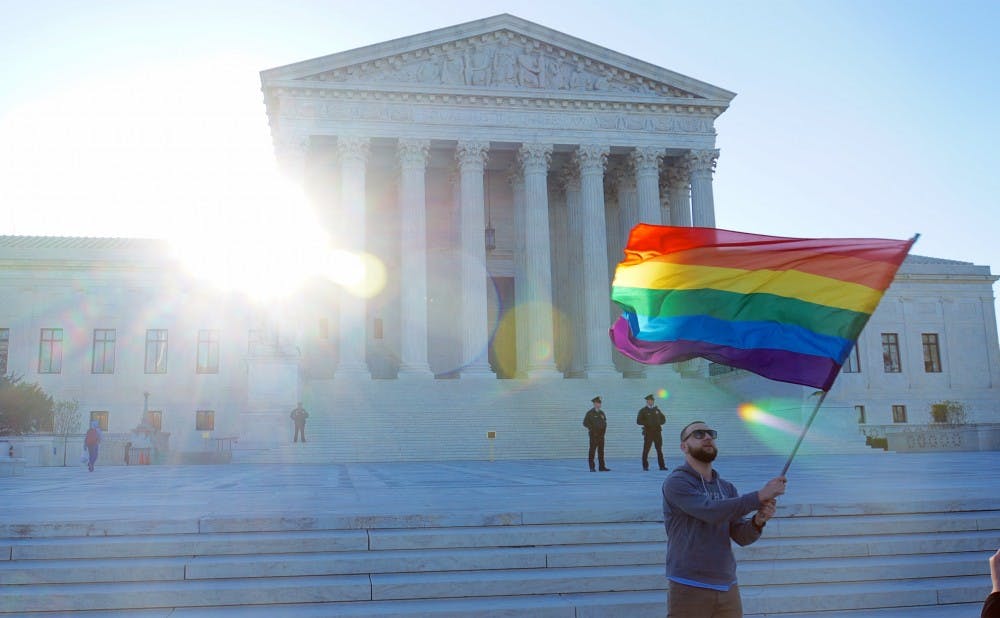A federal district court recently dismissed a lawsuit challenging Senate Bill 2, a North Carolina law that allows magistrates to refuse to marry same-sex couples based on religious objections.
The lawsuit, Ansley v. Warren, challenged the constitutionality of SB2, claiming that it violates the establishment clause of the First Amendment—which prevents government from establishing religion—by allowing taxpayer funds to be used for religious purposes. In a ruling issued Sept. 20, U.S. District Judge Max Cogburn dismissed the challenge on the grounds that the plaintiffs lacked standing to sue. The plaintiffs have since filed an appeal to the U.S. Fourth Circuit Court of Appeals.
“The foundation of our judicial system, in Article 6 of the Constitution, is that every state judge has to swear to uphold the federal Constitution,” said Luke Largess, lead counsel in the case and Trinity ’79. “All these magistrates have taken that oath, and now they’re saying they have a religious exemption from that oath—that’s what this case challenges.”
Senate Bill 2, not to be confused with House Bill 2, was passed into law in 2015 by the North Carolina General Assembly. The law allows magistrates and registers of deeds to exempt themselves from marriage-related procedures on the basis of their religious beliefs.
In May 2015, Governor Pat McCrory vetoed the Bill, but that veto was soon overridden. Since the law went into effect, at least 32 magistrates exempted themselves from performing marriages and register of deeds employees in five counties have also done so. The largest impact was felt in McDowell County, where all four magistrates recused themselves at one point, according to September 2015 data reported by the Administrative Office of the Courts and N.C. Association of Registers of Deeds.
However, Jane Wettach, clinical professor of law, said that Ansley v. Warren was decided not on the constitutionality of SB2 but on standing, which is a “technical distinction.”
“Standing is a very tricky issue in the law,” she said. “It’s a pretty fine line between who has standing and who doesn’t in a case like this, where the plaintiffs were not directly affected by the law.”
In the majority of cases, only people directly affected by the law can bring a legal challenge. However, that is difficult in the case of SB2, because no same-sex couples are technically denied the right to marry, which means any harm or injury is difficult to prove, Largess noted.
"As Plaintiffs have made no allegations of an 'injury in fact' that might otherwise allow them to assert standing in this case, plaintiffs have failed to meet their burden of showing they have standing to bring Due Process and Equal Protection claims," Cogburn wrote in his decision.
Largess explained that this difficulty in proving harm or injury is "the evil genius of the law."
"The whole point was to allow these magistrates to declare their religious objections, but make sure that there would never be a person that couldn’t get married, so they couldn’t challenge the law,” Largess said. “They knew that if somebody couldn’t get married, the whole thing will be [declared unconstitutional] in an instant.”
The plaintiffs’ strategy in Ansley v. Warren was to rely on “taxpayer standing” to bring their case. To accommodate magistrates who recuse themselves, the judiciary has to make alternative arrangements such as locating and funding substitutes. Because these policies use taxpayer money, the plaintiffs argued that this spending violates the establishment clause of the First Amendment.
Judge Cogburn was not swayed by the argument as he considered such policies to be discretionary spending, which is not covered by the Establishment Clause.
Pope McCorkle, associate professor of the practice in the Sanford School of Public Policy, noted that Cogburn is an Obama appointee and that the ruling appeared to be “narrow and technical.” However, McCorkle said he believed that the court may be willing to rule SB2 unconstitutional if factual circumstances surrounding the plaintiffs were different. In his opinion, SB2 will ultimately be overturned in court instead of being repealed by legislative action.
Largess said he expects the Fourth Circuit to return a decision by May of next year. If the ruling is reversed, then the case will be returned to district court, where the substantive arguments on constitutionality can finally be heard. Wettach and McCorkle both agreed that the plaintiffs have a compelling case on the unconstitutionality of SB2.
“The Supreme Court ruled that same-sex marriage is constitutional, and the magistrates have an obligation, just like all elected and appointed officers, to uphold the Constitution,” Wettach said. “It is hard to see in my view how they can have an exemption.”
McCorkle said that you should not be "a magistrate if you have a problem with the law."
As the appeal process begins, Largess is confident that the Fourth Circuit will rule in favor of the plaintiffs, and that the constitutionality challenge will succeed eventually and overturn SB2 for good.
“If the court finds we have standing, we win the case,” he said.
Get The Chronicle straight to your inbox
Signup for our weekly newsletter. Cancel at any time.

